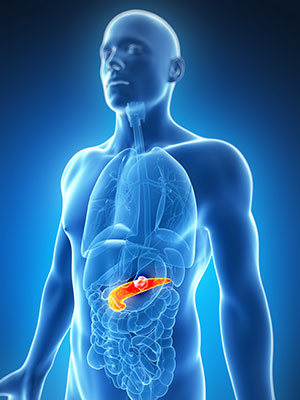Until now men were thought to be more likely than women to develop pancreatic cancer, which makes up around 3% of all cancers in the U.S. and causes around 7% of all cancer-related fatalities.
However, a recent nationwide study indicates that pancreatic cancer rates are rising and rising faster in women than in men. This study was published in the journal Gastroenterology also found it is rising faster among men too but not as much as women.
After examining data from the National Programme of Cancer Registries (NCPR) database from 2001 to 2018, researchers from Cedars-Sinai Cancer identified the worrying trend of pancreatic cancer rising in females. The database represented 64.5% of Americans.
After analysing the data, the researchers found 454,611 cases of pancreatic cancer.
They also found that both men and women were developing pancreatic cancer at higher rates. The rates among women under the age of 55 increased 2.4% more than those among men in the same age group. The statistics also revealed that young Black women had pancreatic cancer rates that were 2.23% higher than those of Black men of the same age.
Researchers discovered that mortality from pancreatic cancer declined in men while remaining unchanged in women.
The authors noticed that the rise in adenocarcinoma histological subtype, a more aggressive form of pancreatic cancer may contribute to the increase in rate.
People with prolonged abdominal pain may fear they have pancreatic cancer, but that’s typically a sign of other conditions, according to a news release. However, people who have jaundice or unexplained weight loss should think about seeing their doctor because these symptoms could indicate pancreatic cancer or other dangerous problems.
“The data shows us a small increase in the risk of pancreatic cancer,” said senior author Srinivas Gaddam, MD, associate director of Pancreatic Biliary Research at Cedars-Sinai in the news release.
“And that awareness might refocus people on the need to stop smoking, reduce alcohol use, eat a healthy diet, exercise regularly, and manage their weight. These lifestyle changes all help decrease the risk of pancreatic cancer.”
Smoking, diabetes, chronic pancreatitis or inflammation of the pancreas, family history of pancreatic cancer, and certain genetic syndromes are all known risk factors. Carrying extra weight that is unhealthy for your body may also be a contributing factor.
- Dark-colored urine.
- Itchy skin.
- Digestive problems, including abnormal stools, nausea or vomiting.
- Pain in the upper abdomen, which may extend to the back.
- Appetite loss.
- Swollen gallbladder (usually found by a doctor during a physical exam)
- Blood clots.
- Diabetes.
The pancreas, a gland in the abdomen that creates hormones like insulin and digestive enzymes, is impacted by pancreatic cancer. It may not exhibit many symptoms, which delays diagnosis until an advanced stage, making treatment more difficult.
But here’s the good news. Pancreatic cancer can be treated much more effectively today. It’s no longer thought of as an automatic death sentence as it once was.
One of the most effective treatments is CyberKnife Radiation Therapy for Pancreatic Cancer
CyberKnife therapy has been used successfully to treat pancreatic cancer in patients who are poor surgical candidates, those who refuse surgery, and in patients for whom surgery or other treatments have failed.
Treating tumors in and near the pancreas with radiation is challenging because the stomach, bowel, kidneys, and liver are in close proximity to the pancreas, making it difficult to target them safely with radiation. As a result, with traditional radiation therapy, the tumor may not receive enough radiation to destroy it, and healthy tissue near the tumor may be damaged.
Pancreatic Cancer Treatment at CyberKnife Miami
CyberKnife’s missile guidance technology and respiratory tracking system eliminates that problem. It enables the radiation beam to track tumor movement in real time as patients breathe normally, always staying on target, delivering the highest dose of radiation possible, and destroying the tumor without harming healthy surrounding tissue.
Another bonus: CyberKnife only requires one to five treatments compared to over 25 to 35 with standard radiation.
The treatment is completely pain free. You feel nothing as the computer-controlled robot moves around the body delivering radiation. Patients dress comfortably in their own clothes and can bring music to listen to during treatment.
Nothing will be required of the patient during treatment, except to relax and lie as still as possible.
Once treatment is complete, most patients quickly return to their daily routines with little interruption to their normal activities.
Early results indicate that patients tolerate the CyberKnife procedure well.
Doctors will discuss all possible side effects prior to treatment. In addition, doctors may prescribe medication to control any side effects, should they occur.
After treatment, the patient will follow-up with their doctor and will have CT or PET/CT scan prior to your follow-up appointment.
The patient should be aware that his or her tumor will not suddenly disappear. Response to treatment varies from patient to patient. It could take several weeks or longer to determine the effectiveness of the CyberKnife treatment.
The types of treatment for pancreatic cancer will depend on the stage of the disease. CyberKnife radiotherapy is also often combined with chemotherapy.
Studies show the growth of pancreatic tumors in patients with advanced disease has been controlled by CyberKnife radiosurgery without damaging normal tissues including bowels, kidneys, and liver.
To find out if you’re a candidate for life-saving CyberKnife radiosurgery, call the CyberKnife Center of Miami at (800) 204-0455.
For all the latest cancer information follow us on Facebook.

